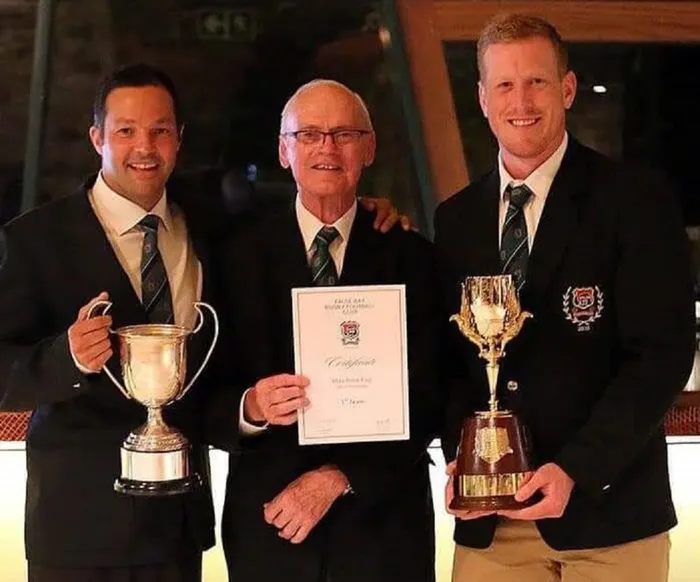Remembering Louis de Waal’s legacy

Louis de Waal flanked by Johnno van der Walt and Graham Knoop.
Occasionally, society is blessed with a truly remarkable human being, one who possesses all the attributes for success mixed with an enormous amount of love for his fellow man. One such person was Louis de Waal, who passed away last week at the age of 86.
Born in Greytown, KZN, Louis received his schooling in Dundee, his all-round prowess as student and athlete nothing short of legendary. He excelled at rugby, cricket, and athletics, where he earned the 400m record which stood for decades at Dundee High. Louis came to the Cape to attend UCT, where he earned his BSc in Civil Engineering. He later received his MSc (Eng.) transportation degree from the University of California at Berkley. His love affair with Table Mountain started during his days at Ikeys, culminating in him serving on the board of the Table Mountain Aerial Cableway Company for 40 years, 20 of which were as chairman. He oversaw the upgrade of the Table Mountain Cableway which was completed in 1997.
Any attempt to capture the enormity of Louis’ success, achievements, benevolence, and impact on society would be nigh impossible within the constraints of an article. His impact on rugby and cycling is what will receive focus.
A lanky, lean eighthman with feel for the game, saw De Waal achieve Western Province colours while at UCT. His influence on the Ikeys game while there as a player is still recognised to date and he continued his relationship with the club throughout his life, as all Ikeys alumni do. UCT Ikeys was still a closed club until much later and once players had completed their studies, they moved.
After completion of his bachelor’s degree at UCT, De Waal joined False Bay Rugby Club, commencing his illustrious involvement with the Constantia club.
His presence had an immediate impact - resulting in the influx of former Ikeys players- which helped to turn False Bay into one of the top rugby clubs in the province. During his 27 years as chairman of the club, The Bay won the Grand Challenge in 1970, two Super League A titles and the Gold Cup - the national club competition. His strong leadership skills had been tested in the early 2000s as the club entered a free-fall which culminated in a year in the third division. His silent, yet formidable style of management, was the backbone of the club’s fightback and has made them the club force that it remains to date.
During a sojourn in Melrose, Scotland, De Waal was exposed to an exciting short format of the rugby game – “sevens”, which he brought back to South Africa, launching the game at False Bay. For some time, the False Bay Sevens was a popular inter-club competition which graduated to an inter-provincial competition. “Grandfather of SA Sevens Rugby” was yet another title this modest man had during his life.
Almost at the zenith of Apartheid, Uncle Louis would go to Gugulethu and coach rugby. As the sun set and darkness fell, Louis would start his trusty Morris Minor , switch the headlights on so the young rugby devotees could complete their practice under “floodflights”.
Away from rugby one would be forgiven to think De Waal’s quiver was now empty. Not so. He, together with Bill Mylrea and John Stegmann organised the Cape Town Cycle Tour, today one of the World’s most eminent cycling events. Ostensibly a protest ride to “encourage” the city to include cycling lanes in their town planning, the first race in 1978 had a modest field and grew to the mega-event it now is. Their wish for cycle lanes may have faltered for years, but the enormity of the event certainly played a massive role in the growth of cycling in our country. Up until the Covid pandemic, Louis was one of the illustrious “Magnificent Seven” riders of every cycle tour to take place, even more remarkable considering that he was into his 80s when he completed the last of his 42 tours.
Louis also played a pivotal role in establishing the Bicycle Empowerment Network (BEN). The organisation promotes sustainable social and economic empowerment through the use of bicycles as transport. Their network of partners are trained to run their business offering services and cycles internationally sourced to their communities, with the dual effect of creating employment while mobilising the community.